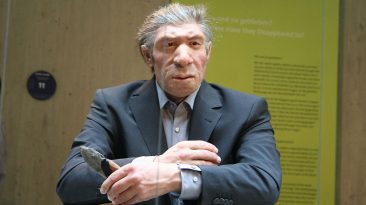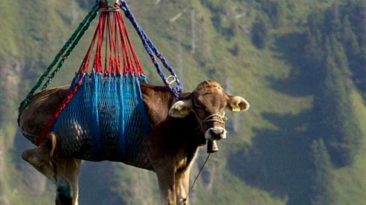What do saber-toothed tigers, woolly mammoths and the dodo all have in common? They’re all extinct, and some theorize humans played a large part in this.
What if we could bring them back? Is it scientifically possible? And would humans remain at the top of the food chain?
One day, this might not be a hypothetical, as science is getting closer to bringing extinct animals back. Known as de-extinction, it’s the process of bringing extinct animals back from the dead. What used to be science fiction is slowly becoming a reality.
It’s possible that this might happen one day, but unfortunately, you won’t be seeing any dinosaurs. Why?
Well, that’s because, in order for this de-extinction process to work, a species’ DNA needs to be of a certain age. Scientists say that DNA becomes unreadable after 1.5 million years, after that amount of time it’s practically useless.
So dinosaurs that went extinct 65 million years ago are ineligible for this experiment. Sorry.
But if the species is young enough, and the DNA happens to be readable, then scientists can use it for genome editing. One of the ways this could work would be using the DNA from extinct species and fusing it with it’s closest animal relative currently living today.
One of the animals that scientists say is eligible for de-extinction? The woolly mammoth.
Small mammoth populations were still alive just 3,600 years ago. Experts believe that this species could have survived extinction if it wasn’t for humans hunting them.
One potential way mammoth de-extinction could work is if scientists were to combine woolly mammoth DNA with that of elephants alive today. Over time these hybrid animals could slowly morph into full-on mammoths, effectively bringing the species back. This might take a few thousand years but over time mammoths could be roaming the Earth again.
If this method were to work, think of all the incredible animals we could have back in our world. The 12-foot-tall giant short-faced bear, hairless dogs, and of course the loveable dodo bird.
Just remember to be wary of the saber-toothed tigers that would be running around. You don’t want to mess with those. If we wanted to get weird, we could even bring back Neanderthals, although that could be incredibly dangerous and would ultimately be a stupid idea.
This species would die pretty quickly as they just wouldn’t be able to survive in our current world. With our diets, germs, and diseases, Neanderthals wouldn’t last long.
That goes for all these other animals we’re bringing back too. Sure, in theory, they should be able to adapt over time, but there are tons of other issues that may come with bringing a species back from extinction.
One thing we’d need to be worried about is just how do we control these species? We wouldn’t want a giant short-faced bear mating with other bears — that could present a number of unknown issues. But what’s to stop them from doing it anyway?
Another question science would need to ask is what exactly is the point of all this? Sure being able to ride a woolly mammoth would be amazing but is it really worth it?
What kind of purpose are these animals serving other than the sake of our entertainment? And there exists the possibility that these new animals would disrupt the current ecosystems we have today, leading to other animals going extinct because of them.
One good thing de-extinction could do is bring back essential animals we have today that might become extinct. Bees have long been talked about as a species that may go extinct relatively soon. If de-extinction technology is finally realized, maybe we’ll never need to worry about it happening.
But that also raises some concern. If that was our reality, people may think it was okay for things to go extinct — since we could always bring them back. This could cause an increase in hunting, and a general carelessness for animals all around the world.
Bringing back a species may sound like an incredible idea, but the risks and unpredictability of it are huge. Maybe it’s just best to take care of what we have now and make sure it doesn’t happen again.
Subscribe to What-If on Youtube or follow the show on Facebook Watch.
Sources
- “Should We Bring Extinct Species Back From The Dead?”. Shultz, David, 2016. Science | AAAS. Accessed April 10 2019.
- “5 Reasons To Bring Back Extinct Animals (And 5 Reasons Not To) – D-Brief”. 2013. D-Brief. Accessed April 10 2019.
- “These Are The Extinct Animals We Can, And Should, Resurrect”. Quill, Elizabeth. 2015. Smithsonian. Accessed April 10 2019.
- “De-Extinction”. 2019. en.wikipedia.org. Accessed April 10 2019.
- “Bringing Them Back To Life”. Zimmer, Carl, 2013. nationalgeographic.com. Accessed April 10 2019.
- “Woolly Mammoths, Tasmanian Tigers, And More Back From The Dead”. Callie Stewart, 2015. All That’s Interesting. Accessed April 10 2019.
- “Inbreeding Did Not Kill Mammoths”. Dhruti Shah, 2012. BBC News. Accessed April 10 2019.
- “Humans Did Not Wipe Out The Neanderthals, New Research Suggests”. Science, Live. 2014. Live Science. Accessed April 10 2019.
- “Mammoth Tooth Discovery Suggests Ancient Beast Was Feeding Just West Of Austin”. Laura Geggel, Live Science. 2017. Seeker. Accessed April 10 2019.



























